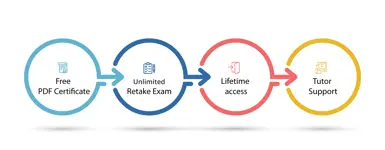Attachment Theory in the Early Years
Mega Sale | Proper Guideline + PDF Certificates | Instant Access | 24/7 Live Support | Lifetime Access
Training Tale
Summary
- Certificate of completion - Free
- Exam(s) / assessment(s) is included in price
- Tutor is available to students
Add to basket or enquire
Overview
Forming attachments in the early years is vital for young children in order for them to grow up and form their own lasting and loving relationships. Knowing that you are loved and cared for, and that your needs will be met, will boost your self-esteem and confidence, as well as promote good mental health as a young baby.
The purpose of completing this Attachment Theory in the Early Years course is to understand the importance of attachment theory in child development and know the best practices when working with children and their families. This Attachment Theory in the Early Years course also looks at the theorists who researched attachment and their recommendations for best practices when working with children and their families.
By the end of this Attachment Theory in the Early Years course, the learner will gain a thorough understanding of the theory behind attachment and how to effectively plan to meet the needs of young children.
Learning Outcomes
After completing this Attachment Theory in the Early Years course, learner will be able to:
- Gain a thorough understanding of attachment theory in child development.
- Know the best practices when working with children and their families.
Why Choose Attachment Theory in the Early Years Course from Us
- Self-paced course, access available from anywhere.
- Easy to understand, high-quality study materials.
- Course developed by industry experts.
- MCQ quiz after each module to assess your learning.
- Automated and instant assessment results.
- 24/7 support via live chat, phone call or email.
- Free PDF certificate as soon as completing this course.
***Others Benefits of Attachment Theory in the Early Years Course:
- Free One PDF Certificate
- Access to Content - Lifetime
- Exam Fee - Totally Free
- Free Retake Exam
[ Note: Free PDF certificate as soon as completing the Attachment Theory in the Early Years course ]
Certificates
Certificate of completion
Digital certificate - Included
Course media
Description
***Attachment Theory in the Early Years***
Detailed course curriculum
Module 1: Attachment Theory
- Attachment Theory
- Theorists
- John Bowlby
- Bowlby’s Four Phases of Attachment Developmental Stages
- Mary Ainsworth
- Strange Situation Procedure
- Application of Ainsworth’s Strange Situation Study
- Types of Attachment
- Secure Attachment
- Insecure Attachment
- Avoidant Attachment
- Disorganised Attachment
- The Key Person Approach
- The Key Person's Role
- Secure Attachment and the Key Person
- Building an Attachment
- Relationships with Parents
Module 2: Putting it into Practice
- EYFS
- Settling Children In – Supporting Transitions
- How the Key Person Approach Works in Practice
- The Child and Key Person Relationship in EYFS
- Attachment-Based Child Care
- Attachment: Relationships and Relating
- Interactions Build Relationships
- Attachment and Cognitive Development in EYFS
- Attachment Behaviours
- Nurturing Attachments
- Interpreting Children’s Behaviour in Terms of their Needs
- Developmental Differences in Attachment Behaviours
- Parents as Partners
- Learning Together
- Effective Practice
Assessment Method
After completing each module of the Attachment Theory in the Early Years Course, you will find automated MCQ quizzes. To unlock the next module, you need to complete the quiz task and get at least 60% marks.
Certification
After completing the MCQ/Assignment assessment for this Attachment Theory in the Early Years course, you will be entitled to a Certificate of Completion from Training Tale. The certificate is in PDF format, which is completely free to download. A printed version is also available upon request. It will also be sent to you through a courier for £13.99.
Who is this course for?
Attachment Theory in the Early Years
This course is ideal for:
- Practitioners in early years settings
- Childminders
- Anyone interested in the well-being and emotional needs of young children.
Requirements
Attachment Theory in the Early Years
There are no specific requirements for this Attachment Theory in the Early Years course because it does not require any advanced knowledge or skills.
Questions and answers
Currently there are no Q&As for this course. Be the first to ask a question.
Reviews
Currently there are no reviews for this course. Be the first to leave a review.
Legal information
This course is advertised on reed.co.uk by the Course Provider, whose terms and conditions apply. Purchases are made directly from the Course Provider, and as such, content and materials are supplied by the Course Provider directly. Reed is acting as agent and not reseller in relation to this course. Reed's only responsibility is to facilitate your payment for the course. It is your responsibility to review and agree to the Course Provider's terms and conditions and satisfy yourself as to the suitability of the course you intend to purchase. Reed will not have any responsibility for the content of the course and/or associated materials.






